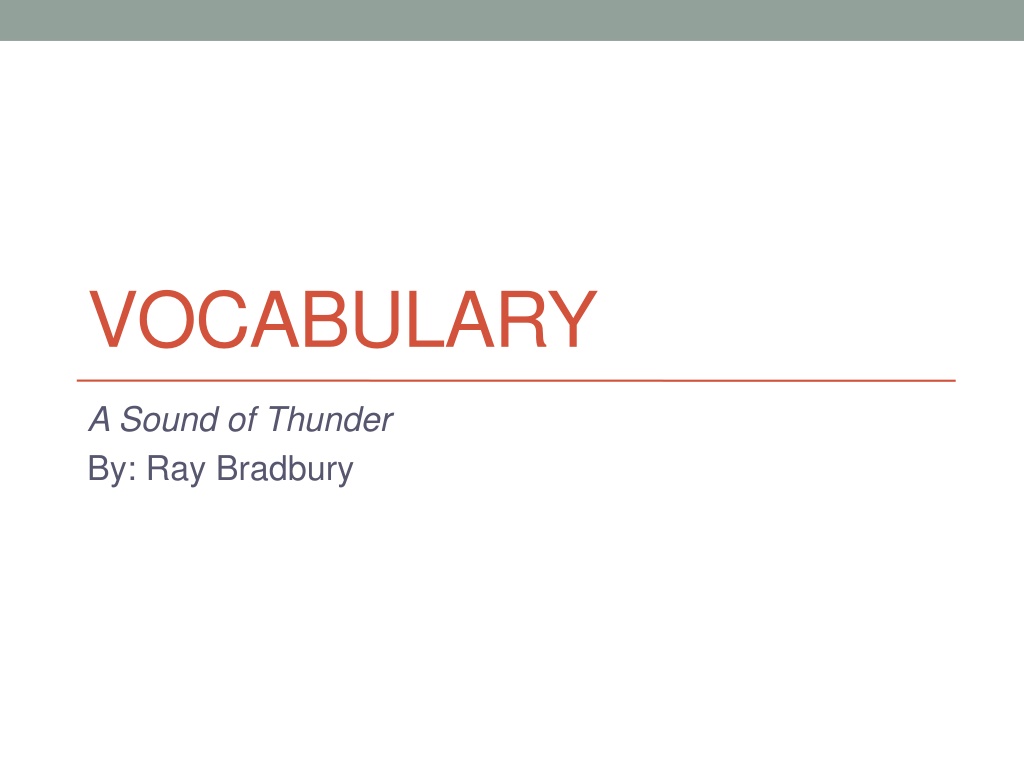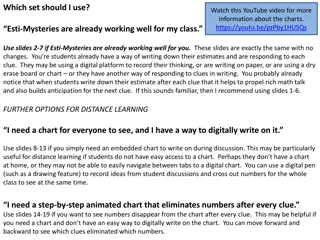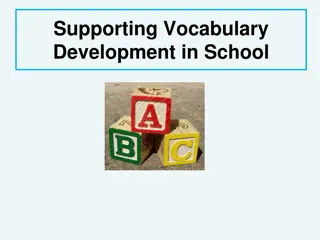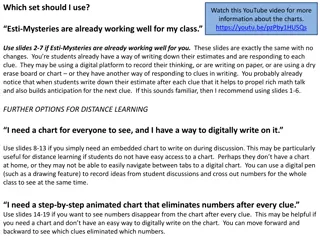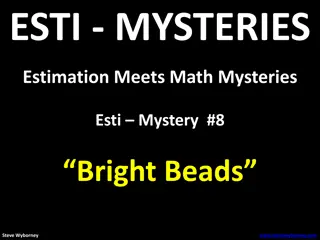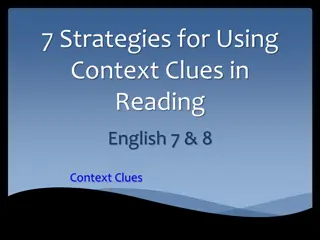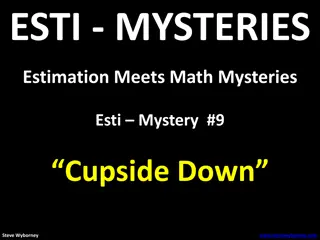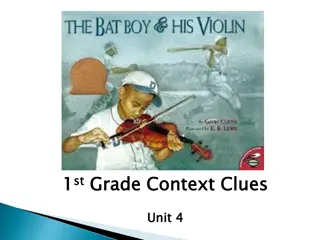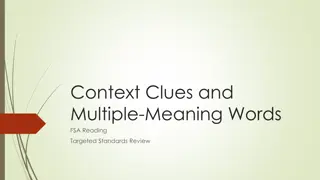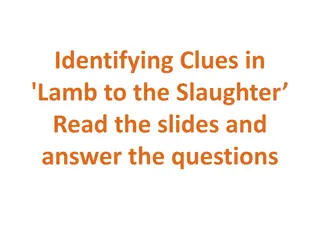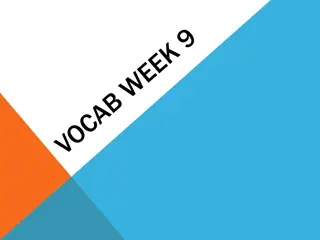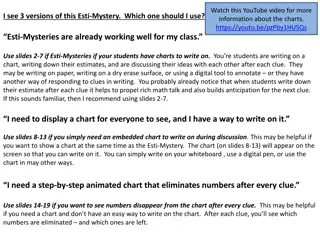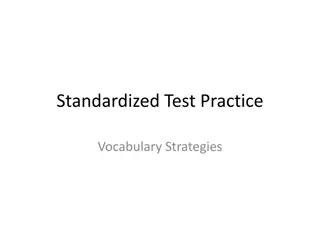Understanding Context Clues for Vocabulary Enrichment
Context clues are essential in deciphering unfamiliar words within a text. By recognizing synonyms, antonyms, explanations, and examples provided by the author, readers can gain a deeper understanding of challenging vocabulary terms. Knowing how to leverage context clues enhances comprehension and promotes vocabulary growth without the need for constant dictionary references.
Download Presentation

Please find below an Image/Link to download the presentation.
The content on the website is provided AS IS for your information and personal use only. It may not be sold, licensed, or shared on other websites without obtaining consent from the author. Download presentation by click this link. If you encounter any issues during the download, it is possible that the publisher has removed the file from their server.
E N D
Presentation Transcript
VOCABULARY A Sound of Thunder By: Ray Bradbury
Create a chart and place the vocabulary words below in the category they belong in for you. Know Well Think I Know Don t Know Annihilate Correlate Expendable Infinitesimally Malfunctioning Paradox Resilient Stagnating Subliminal Undulate
Now for a closer look What are some different ways we could figure out what these words mean without looking them up?
Context Clues Context Clues are hints that the author gives to help define a difficult or unusual word. The clue may appear within the same sentence as the word to which it refers, or the sentences immediately before and/or after. Because most of your vocabulary is gained through reading, it is important that you be able to recognize and take advantage of context clues.
There are four main types of context clues to look for. Synonyms Antonyms Explanations Examples
Types of Context Clues: Synonym What s a synonym? a word with the same meaning, used in the sentence. Example: My opponent's argument is fallacious, misleading, and just plain wrong.
Types of Context Clues: Antonym What s an antonym? A word or group of words that have the opposite meaning can reveal the meaning of the unknown term. Example: Although some men are loquacious, others hardly talk at all.
Types of Context Clues: Explanation The unknown word is explained within the sentence or in a sentence immediately preceding. Example: The patient is so somnolent that she requires medication to help her stay awake for more than a short time.
Types of Context Clues: Example Specific examples are used to define the term. Example: Celestial bodies, such as the sun, moon, and stars, are governed by predictable laws.
Roots: What are they? A root, as its name suggests, is a word or word part from which other words grow, usually through the addition of prefixes and suffixes.
Roots: Example The root of the word vocabulary, for example, is voc, a Latin root meaning "word" or "name." This root also appears in the words advocacy, convocation, evocative, vocal, and vociferous.
Roots: How can they help? Understanding the meanings of the common word roots can help us deduce the meanings of new words that we encounter. But be careful: root words can have more than one meaning and various shades of meaning. In addition, words that look similar may derive from different roots. So when you meet up with a new word, be sure to rely on a dictionary to check its definition.
annihilate Context clues one particular mouse destroyed With a stamp of your foot you annihilate first one, then a dozen Roots Nihil: nothing Ate: to do (Latin) (Latin)
correlate Context clues I note the exact hour, minute, and second. I shoot a paint bomb. It leaves a red patch on his side. We can t miss it. Then I correlate our arrival in the Past so that we meet the Monster not more than two minutes before he would have died anyway. Roots Cor: together with Late: to bear or carry (Latin) (Latin)
expendable Context Clues And the caveman, please note, is not just any expendableman, no! He is an entire future nation. Roots Able: suitable skills to accomplish something (Latin) Pend: to cause to hang down, weighing down (Latin)
infinitesimally Context Clues Crushing certain plants could add up infinitesimally. A little error here would multiply in sixty million years, all out of proportion. Roots Fin: end, last; limit, border, boundary (Latin)
malfunctioning Context Clues you could hear the sighs and murmurs as the furthest chambers of it died, the organs malfunctioning, liquids running a final instant from pocket to sac to spleen, everything shutting off, closing up forever. Roots Funct: to perform or execute Mal: bad or badly (Latin) (Latin)
paradox Context Clues That d be a paradox, said the latter. Time doesn t permit that sort of mess a man meeting himself. Roots Dox: believe, that which is thought to be true (Greek) Para: wrong, irregular, abnormal (Greek)
resilient Context Clues It came on great, oiled, resilient, striding legs. It towered thirty feet above half of the trees Roots Re: again Sili: leap, jump, spring forward Ent: signifies action or being (Latin) (Latin) (Latin)
stagnating Context Clues They gazed back at the ruined Monster, the stagnating mound, where already strange reptilian birds and golden insects were busy at the steaming armor. Roots Sta: to stay Ate: to do (Latin) (Latin)
subliminal Context Clues there was a thing to the air, a chemical taint so subtle, so slight, that only a faint cry of his subliminal senses warned him it was there. Roots Lim: point at which something begins or changes (Latin) Sub: below or beneath (Latin)
undulate Context Clues In the slime, tiny insects wriggled, so that the entire body seemed to twitch and undulate, even though the monster itself did not move. Roots Undu: flow, wave, billow Ate: to do (French) (Latin)
Now try again: place the vocabulary words below in the category they belong in for you. Know Well Think I Know Don t Know Annihilate Correlate Expendable Infinitesimally Malfunctioning Paradox Resilient Stagnating Subliminal Undulate
Did you have more in the Know Well Think I Know
Match up words to Definitions Below the level of consciousness Not working or operating properly To move in waves or in a smooth, wavelike motions. To destroy completely A statement or event that sounds impossible but seems to be true Not worth keeping; not essential To figure out or create a relationship between two items or events Strong but flexible; able to withstand stress without injury In amounts so small as to be barely measurable Becoming foul or rotten from lack of movement
Are there any words still in the I Don t Know
